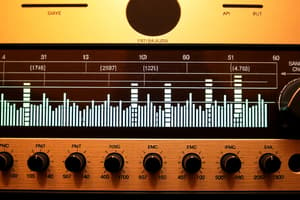Podcast
Questions and Answers
What major advantage do digital audio consoles offer over traditional analog mixers?
What major advantage do digital audio consoles offer over traditional analog mixers?
- Unprecedented control, flexibility, and precision (correct)
- Limited channels and poor sound quality
- Lower cost and easier maintenance
- Incompatibility with modern audio equipment
When did the transition from analog to digital consoles begin?
When did the transition from analog to digital consoles begin?
- Around the 2000s
- Around the '70s
- During the '80s
- Around the '90s (correct)
What core component of digital audio consoles performs complex signal processing functions?
What core component of digital audio consoles performs complex signal processing functions?
- Digital Signal Processor (DSP) (correct)
- Loudspeakers
- Physical faders
- Analog mixer
What is a key feature that modern professional-grade digital consoles often boast?
What is a key feature that modern professional-grade digital consoles often boast?
Which function does a Digital Signal Processor (DSP) in digital audio consoles NOT perform?
Which function does a Digital Signal Processor (DSP) in digital audio consoles NOT perform?
Why are modern professional-grade digital consoles considered ideal for a wide range of applications?
Why are modern professional-grade digital consoles considered ideal for a wide range of applications?
What is a key advantage of using digital audio consoles over traditional analog mixers?
What is a key advantage of using digital audio consoles over traditional analog mixers?
Which feature is typically incorporated in modern DACs to optimize workflow efficiency?
Which feature is typically incorporated in modern DACs to optimize workflow efficiency?
What audio protocol expands the reach of DACs within and beyond venues?
What audio protocol expands the reach of DACs within and beyond venues?
How do digital audio workstations (DAWs) assist in the design phase of audio production?
How do digital audio workstations (DAWs) assist in the design phase of audio production?
What is a notable advantage of leveraging interchangeability between DAWs and DAC software?
What is a notable advantage of leveraging interchangeability between DAWs and DAC software?
Why are digital audio consoles considered indispensable in today's industry?
Why are digital audio consoles considered indispensable in today's industry?
What is the primary driving force behind the evolution from analog to digital technology in audio systems?
What is the primary driving force behind the evolution from analog to digital technology in audio systems?
Which major element of a digital audio console is responsible for converting analog signals to digital data?
Which major element of a digital audio console is responsible for converting analog signals to digital data?
What distinguishes digital audio consoles from analog consoles in terms of routing options and effects capabilities?
What distinguishes digital audio consoles from analog consoles in terms of routing options and effects capabilities?
What is a key advantage that digital audio consoles provide through the utilization of integrated circuits?
What is a key advantage that digital audio consoles provide through the utilization of integrated circuits?
What is the primary function of ADC chips in a digital audio console?
What is the primary function of ADC chips in a digital audio console?
Which aspect of digital audio consoles has allowed engineers and performers to create exceptional sonic experiences?
Which aspect of digital audio consoles has allowed engineers and performers to create exceptional sonic experiences?
What is the primary responsibility of DSP chipsets in digital audio consoles?
What is the primary responsibility of DSP chipsets in digital audio consoles?
In digital audio consoles, what do output modules primarily do?
In digital audio consoles, what do output modules primarily do?
What aspect of digital audio consoles poses a challenge related to IT skills requirement?
What aspect of digital audio consoles poses a challenge related to IT skills requirement?
Which factor is a notable limitation associated with most digital audio consoles due to their reliance on computer platforms?
Which factor is a notable limitation associated with most digital audio consoles due to their reliance on computer platforms?
What characteristic of digital audio consoles makes the learning curve somewhat steep for novice users?
What characteristic of digital audio consoles makes the learning curve somewhat steep for novice users?
What key aspect makes digital audio consoles an exciting yet challenging toolset for professionals and enthusiasts?
What key aspect makes digital audio consoles an exciting yet challenging toolset for professionals and enthusiasts?
Flashcards are hidden until you start studying
Study Notes
Understanding Digital Audio Consoles
Digital audio consoles (DACs) have revolutionized live sound mixing by offering unprecedented control, flexibility, and precision over music and event performances. These powerful tools replace traditional analog mixers with digital processing capabilities, allowing engineers to manipulate sounds more precisely while retaining high quality even when working with large numbers of channels.
History and Evolution
The transition from analog to digital consoles began around the '90s with the introduction of early digital mixer systems like Midas XL4 and Yamaha PM1DA. Although these initial DACs were limited compared to modern alternatives, they paved the way for progressively more advanced digital technology in audio mixing equipment. Today's professional-grade digital consoles often boast thousands of inputs and outputs, expansive user interfaces, efficient networking options, and intuitive operation software, making them ideal for a wide range of applications, including concerts, theater productions, and corporate events.
Key Components and Capabilities
A core component of digital audio consoles is their dedicated processing engine known as a Digital Signal Processor (DSP), which performs complex signal processing functions such as filtering, equalization, compression, expansion, and delay without degrading the original signal. These processors enable engineers to handle numerous simultaneous input signals with ease, providing higher stage volumes, better clarity, and improved overall performance during shows.
Modern DACs typically incorporate touchscreens, rotary encoders, faders, and assignable user buttons tailored to optimize workflow efficiency and ergonomic comfort. They also come equipped with various connectivity features, including USB, MIDI, Ethernet, WiFi, Bluetooth, and AES/EBU connections, enabling real-time communication among multiple devices. Networked audio protocols such as Dante™ and AVB further expand the reach of DACs within and beyond venues.
Digital audio workstations (DAWs) play an integral role in the design and implementation phases, facilitating preproduction tasks through virtual mixing and editing prior to onsite setup. Simultaneously, compatibility between DAWs and DAC software allows seamless integration of both disciplines during production. Interchangeability between platforms empowers engineers to leverage the advantages offered by each tool, maximizing time savings and productivity.
Advantages Over Traditional Analog Mixers
One key advantage of using digital audio consoles over traditional analog mixers lies in their unmatched technical capabilities, which include:
- High channel count capacity
- Greater signal-to-noise ratio
- Superior dynamic range and resolution
- Enhanced sound accuracy and consistency
- Improved versatility due to programmable presets
- Streamlined automation, recalling settings quickly
These benefits make digital consoles indispensable in today's demanding industry, where maintaining sonic integrity throughout every aspect of live sound reinforcement and post-mix duties has become paramount.
In conclusion, digital audio consoles offer unprecedented levels of sophistication and functionality, streamlining the mixing experience for audio professionals across diverse markets. By leveraging this revolutionary technology, engineers can achieve superior results, pushing creative boundaries while delivering exceptional performances.
Studying That Suits You
Use AI to generate personalized quizzes and flashcards to suit your learning preferences.


